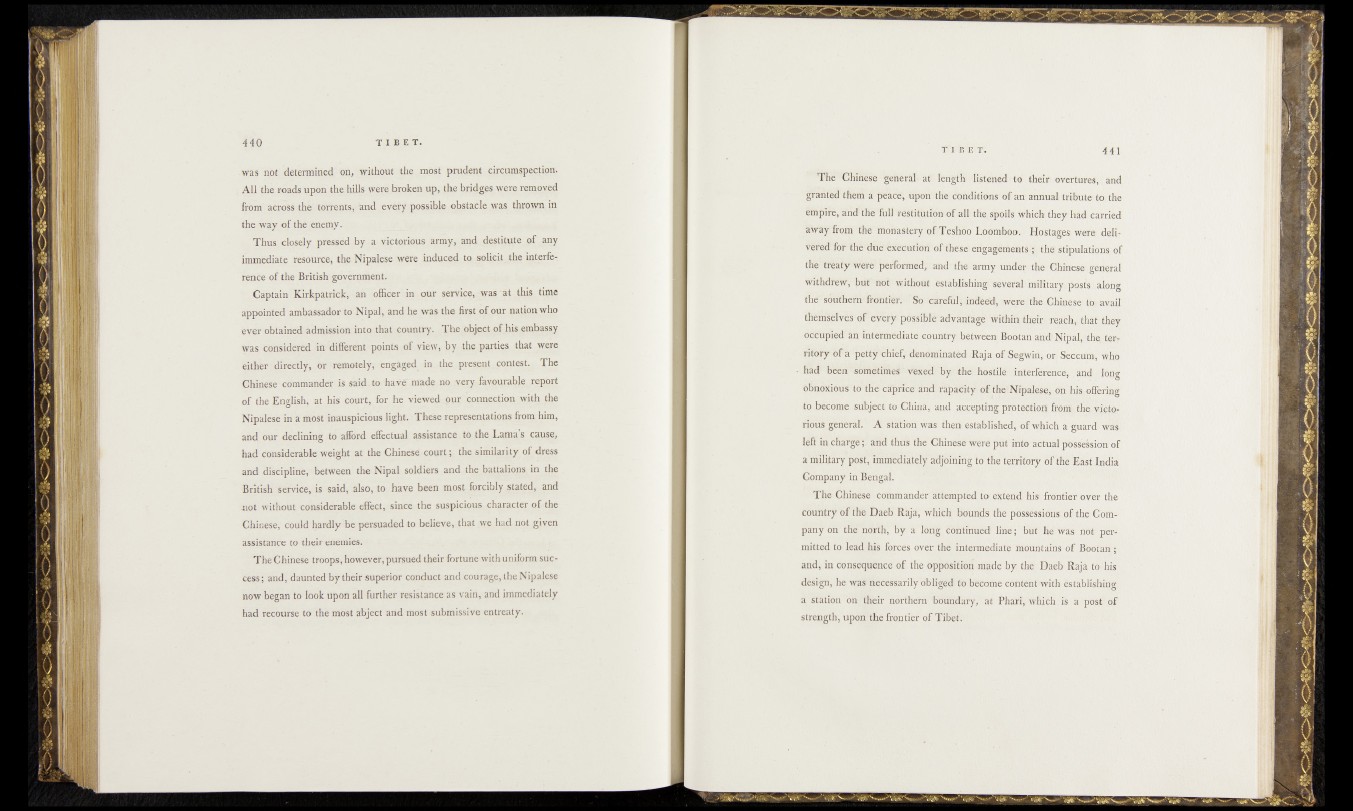
was not determined on, without the móst prudent circumspectipn.
All the roads upon the. hills were broken up, t„he bridges were removed
from across the torrents, and every possible obstacle yyas thrown in
the way of the enpmy.
Thus closely pressed by a victorious army, and destitute of any
immediate resource, the Nipalese were induced to solicit the interfe-
rence of the British government.
Captain Kirkpatrick, an officer in our service, was at this time
appointed ambassador to Nipal, and he was the first of our nation who
ever obtained admission into that country. The object of his embassy
was considered in different points of view, by the parties that were
either directly, or remotely, engaged in the present contest. The
Chinese commander is said-to have made no very favourable report
of the English, at his court, for he viewed our connection with the
Nipalese in a most inauspicious light. These representations from him,
and our declining to afford effectual assistance to the Lama’s cause,
had considerable weight at the Chinese court; the similarity of dress
and discipline, between the Nipal soldiers and the battalions, in the
British service, is -said, also, , to have been most forcibly .stated, and
.not without considerable effect, since the suspicious character of the
Chinese, could hardly be persuaded to believe, that we had not given
assistance to their enemies.
The Chinese troops, however, pursued their fortune with uniform success
; and, daunted by their superior conduct and courage, the Nipalese
now began to look upon all further resistance as vain, arid immediately
had recourse to the most abject and most submissive entreaty.
The Ghihese 'geherab a$fength* -'listened * 'té their* Overtures,-'and
granted them5aV^ëaoé’; c^^dM'disf'ctf' an‘artdüal!tribute fo>the
tffipire, and* the’full 'ies£ilut?bhRof'<all the. spoil's which; tBe^ïhaé èarijied
away from the monastery of Tj|s|i0o*; Lpèmbqox Hostages» were delivered
Tók thesdÖèt'éxëcutioïi of Ihë'scK erigagMehtsé; ||pula-rions. of
the' trêaty'-Wëre performed, andri&è* army-under thé' Chinese gpitef ai
withdraw, 'but^rióï1 without esta^ishingrseveral'.l^|ita|y£^®sts^alQn'g
the southern fronti’érfffl So carefülpindeëd, were ithê-CMuese: travail
themselves offevbr^‘pèsriblênadVanfagi''withiivtheirs-re^h^ats they
occupied an intermediate' country between Bootamanldt^fpal'ïfthej jt;er7
ritory of< a petty'chief, denominatéd Raja GfiSeg-wm, oft See curdy
had beén-'sometime^' vèxed- hy = the' hostilë.ifnlërfëreëcé, .and -*lbfig
obnoxious'ld' the caprice and ra^adrty of thè.'Nipalese, onL-hlfeofiering
to become subjeGt to China, and accepting protection frbm^thoidSgtb1-
rious general. A station was them established,’ ofrwhiBh a guard was
left in charge;, and thus the Chinese were put5intdactÖaï pBsséssioff óf
a military post, immediately adjoini^ to the territory of the‘East India
Company in Bengal. '
The Chinese commander' attempted to extend'^frontier over thé
country of the Daeb Raja, which b'ótmd’s' the phssgssMis-.ofi the Company
on thé north, by a long cóntinued Ifne’1;, Êüt Md was nö^ pér^
mitted to lead his forces over the intermediate1- mountains of Bbótafij
and, in consequence of the opposition made by £he Daeb Raja tépiis
design, he was necessarily bbligèd tb Become contënfwith establishing,
a station on. their northern 'böÖÈfdary,' af Phari, wfri'dh; is a post of
strength, upon the frontier of Tibet-.